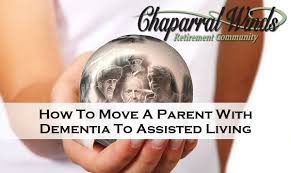
If you are searching for “how to move a parent with dementia to assisted living“, this post should help!
While there aren’t any true guidelines for when it is time to move your loved one into a assisted living facility, however you can be looking out for signs that are pointing that it is time to move them to assisted living or memory care.
One of the issues is that people set strict guidelines. They will state that they’ll move a loved one if they begin to forget their name or if they forget how to use the toilet, but it is possible that your loved one will not have those changes. Meanwhile, you and your loved ones could be hanging in there trying to help care for someone who has dementia while at home and you may benefit by moving them to dementia care.
Signs That It Could Be Time For Assisted Living
You need to be looking for any of these signs that it could be time to move your loved one to a assisted living facility:
1. Your loved one who has dementia is not safe at home.
The main reason that you move your loved one into assisted living is when there aren’t enough resources to safely care for a person who has dementia at home. It is recommended that you take a look at these safety issues to help assess your loved one’s situation:
- Has your loved one fallen down recently? Has it been more than once?
- Have they become physical aggressive to others or yourself?
- Are they leaving burners on when they try to cook?
- Are they able to store and prepare food safely?
- Are they eating regularly? Are they gaining/ losing unusual amounts of weight?
- Are they missing their medication doses? Are they taking too much medication?
- Are they starting to wander and/or forgetting where they are when they are out of the home?
- Are they driving, when they were told not to?
- Do you believe that your loved one is in some way being physically harmed by a caregiver?
- Are they vulnerable to a financial scam or been victimized by one?
2. You are beginning to get burned out.
Being burned out is basically an umbrella term that means that a lot of situations are difficult for a caregiver. Some can be physically exhausted because of the needs of a loved one, and then their health suffers. Others get emotionally worn out, feel that they are losing themselves, or get socially isolated. Try not to get frustrated, it can only make the situation worse.
Guilt also fits into burn out. If you have been locked into a cycle of being stressed out, poorly equipped to care for your loved one, or angry. If you are feeling guilty for having those thoughts, then it is time to start to look for dementia care. Guilt is what you should feel if you have done something wrong. Being angry that a loved one was diagnosed with dementia or just wishing that you had more free time isn’t something that you should feel guilty over.
3. Your loved one who has dementia is bored.
Whenever your loved one is asking what you are going to do, following you around, they most likely need more stimulation. Memory care communities have activities that are made for people who have dementia and it also allows people to be with others who also have dementia.
It is about giving them purpose and meaning in their day. Don’t feel bad if you aren’t meeting these needs anymore. Caregivers can be burdened that they forget that the person who has dementia isn’t getting the stimulation they need and the decline may be come faster.
Steps for Researching Memory Care
Understanding that you will have to look for dementia care is the first step in a long process. To help find a facility near you that specializes in memory care, Caring.com will provide a big directory of memory care communities all over the nation. There you will be able to find details about the care provided as well as consumer reviews.
Here are some additional steps to help aid you in your research:
1. Connect with the Alzheimer’s Association.
You can contact your local Alzheimer’s Association who can provide you with vital information about resources and even more the social and emotional support that you will need while you go through the process.
2. Begin looking for dementia care early.
Take time and research communities in the area early on, so there isn’t a need to make a hasty decision during a bad situation. Understand that whenever you pick assisted living that doesn’t have memory care, that there may be additional costs or the costs to moving to a new community.
Ensure that you evaluate the activity programs as it will help to provide plenty of stimulation for the brain of your loved one for quality of life that is better.
3. Hire an expert in Geriatric Care.
There are professionals who actually specialize in helping caregivers’ research options for memory care. The advantage of hiring these professionals is to help you locate a great match for your loved one which will make the conversations much easier, because they are able to help with discussions about the move.
4. Talk to a lawyer.
Ideally your loved one and family will take care of the financial and legal planning issues after diagnosis. A person who has dementia can and should be involved in outlining their care wishes as dementia beings to progress.
This process needs to provide caregivers with powers of attorney and health directives which can help when it is time to make the move. If you don’t have these, and your loved one is resisting the needed move, then you have 2 choices:
- You could invest in a web of volunteer and paid care at home as well as day programs.
- You can also hire a lawyer to deal with the legal paperwork that is needed to give you the power to make the decisions for them.
5. Learn as much as you can about dementia.
There are certain things that will happen with the disease no matter where your loved one is living. Understanding how dementia will affect your loved one can help you to know how you both can handle the situations you are in together.
Tips to make the needed move to assisted living much easier
Tip 1. Invite them to lunch
If your loved one is still undecided about moving to an assisted living community, then invite them to make a few visits during lunch or attend events at the few places that you have been looking at. Make these activities social and fun which can increase the warm familiarity within the communities.
Tip 2. Get paired up with other residents
Ask the staff to pair you with 1 or 2 other residents who are social and outgoing. Don’t mention to your loved one that you are planning for them to live there. Instead introduce them to the residents and start with a compliment about your loved one. Take this for instance: “This is my mom, Judith. She’s an amazing cook.” Then after you have visited a few more times, suggest that they may want to spend a bit more time there with their new friends. After that, give them the good news that there is a great room where she can stay for a few days.
Tip 3. Tell them it’s just temporary
People who have dementia may not want to permanently move can make the transition much easier if you tell them that it is just temporary and for a practical reason. For instance, you could say that they need to be out of the house so that you can have it painted, or that they need to go somewhere where their health can be taken care of for a while.
Tip 4. Help make arrangements
Families will often make the arrangements, pick and decorate the apartment or room in the facility and then collaborate with the staff so that everyone will know what the excuse is for this move. Once they are engaged in the community, they will accept the permanent situation.
You will want to keep your tone as happy as possible; it will be hard and bury the guilty feelings that you have. It could be hard to lie to your loved one, but you want to understand that telling the truth could actually hurt them.
Tip 5. Make your first visit short and sweet
Once they have finally moved in, make your first visit short and sweet. Keep the conversation positive. They will ask when they are going home. Just avoid telling them that they are living there now, and just divert the conversation by talking about activities, new friends, and food. Keep in contact with the staff. If they happen to report that they are agitated after the visit, you may want to give them more time in order to adjust to their new home before you continue regular visits.
The choice about moving to dementia care needs to be a team choice. The only guideline is to make the choice with your team, which includes your loved one with dementia, your family and the doctor.
Chaparral Winds Offers The Finest Retirement Living In Surprise, Arizona
Chaparral Winds is a retirement facility in Surprise, Arizona offering assisted living, independent living, and memory care services. For more information about our senior living facility, SLS Communities or to schedule a tour, please call us today at 623-343-4125.







